![]()
Irish philosopher (idealist) and bishop. Educated at Trinity College, Dublin where he became a fellow in 1707. He stayed at Trinity for five years serving the college in different capacities. Berkeley then moved to London and spent much time travelling in France and Italy for the next ten years. (The fact that he was in London in 1715 disproves the story that Malebranche died of a fit of apoplexy, brought on by arguing with Berkeley.) In 1724, promised a sum of 20,000 pounds by parliament, he entered a project with enthusiasm for founding a college in Bermuda for Christian education. He arrived and settled, with his new wife, in Rhode Island in 1728. While there he corresponded with with the American philosopher Samuel Johnson. Unfortunately the promise of funds, where never fulfilled. Disappointed he went back to England in 1732, and was made bishop of Cloyne in 1734. The next 20 years he spent raising his family "in a remote corner of Inokelly". 1752 he moved to Oxford to be with his son. Some Works: A New Theory of Vision (1709); Treatise Concerning the Principles of Human Knowledge, On Motion (1721), The Theory of Vision or Visual Language, Vindicated and Explained (1733).
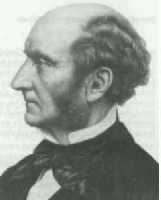 John Stuart
Mill (1806-1873)
John Stuart
Mill (1806-1873)
English philosopher and Economist, and the most influential liberal thinker of the 19th century. As the son of James Mill, John was given an intensive private education, in which he began Greek at the age of three, and Latin (and six of the Dialogues of Plato) at the age of eight (Mill himself remarks that the Theaetetus might have been a little much for him). As a teenager he was immersed in his father's philosophical and political interests until a nervous breakdown at the age of 20 led to a re-evaluation, and softening of his somewhat radical position. Thereafter, influenced by Saint-Simon and others, Mill maintained a more sophisticated appreciation of the historical forces moulding peoples' ideas, and a less cynical view of the forces of reaction. From 1831 his friendship with the married Harriet Taylor was central to Mill's life; in 1849 after the death of her husband they married. Harriet Taylor died in 1858 in Avignon; the nature of her influence on Mill's thought is interesting and complex. Some Works: System of Logic (1843), Principles of Political Economy (1848), On Liberty (1859), Utilitarianism (1861), Subjection of Women (1861, published in 1869)
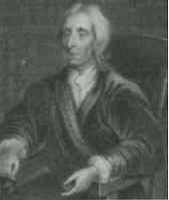 John
Locke (1632-1704)
John
Locke (1632-1704)
English philosopher. Locke was born in Wrington, Somerset and educated in Oxford, where he seemed destined for a career in medicine. In 1666 he met Anthony Ashley-Cooper, later the 1st Earl of Shaftesbury, who became his friend and patron. From 1675 to 1679 Locke lived in France, where he studied the works of Descartes and Gassendi. Shaftesbury, who had been much engaged with parliamentary opposition to the house of Stuart, fled to Holland in 1681, and Locke followed in 1683, returning to England after the accession of William of Orange in 1688. He was given minor administrative functions by the government, and lived out his life quietly at the house of Damaris, Lady Masham in Essex. Works: Concerning Human Understanding (1689), The Two Treaties of Government (1689), A Letter Concerning Toleration (1689), Some thoughts Concerning Education (1693), The reasonebleness of Christianity (1695)
 Bertrand
Arthur William Russell (1872-1970)
Bertrand
Arthur William Russell (1872-1970)
English philosopher. Russell was born into a liberal and aristocratic family descended from a Prime Minister. He was educated at Trinity College, Cambridge, where he read mathematics. He later became devoted to the foundations of mathematics. From 1907 to 1910 he worked in collaboration with Whitehead for ten to twelve hours a day eight months a year on Principia Mathematica. During this period he also laid the foundation of his life as a radical, active, liberal intellectual, beginning by standing as a suffragist candidate for parliament. During the First World War he was imprisoned for six months for publishing the statement that American soldiers would be employed as strike-breakers in Britain, "an occupation to which they are accustomed when in their own country".
After the war, Russell visited Russia and lived for a period in
China. He opened an ran a school, but from 1938 to 1944 taught at a
number of American universities. He was however denied employment by
the City university of New York, on the grounds that his works were
"lecherous, libidinous, lustful, venerous, erotomaniac, aphrodisiac,
irrelevant, narrowminded, untruthful, and bereft of moral fiber". In
the late 40's Russell published his last important philosophical
work, but by this time, he was a world famous symbol of philosophy
and its radical potential. He was awarded the Nobel Prize for
literature in 1950, and as the unmistakeble patriarch of the liberal
academic world spent the rest of his life actively campaigning for
nuclear disarmament.
Works: The Principles of Mathematics (1902), The Analysis of
Mind (1921), The Analysis of Matter (1927)
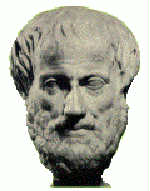 Born at
Stagira in Macedonia, the son of Nicomachus, Aristotle was together
with Plato the most influential philosopher of the western tradition.
At age 17 he entered Plato's academy in Athens, and remained there
until Plato's death. Aristotle then accepted the invitation of
Hermias to reside at Assos. Upon the death of Hermias (whose niece,
Pythias, he married) in 345, Aristotle went to Mytilene on the island
of Lesbos. Between 343/2 and 340 he acted as the tutor to the young
Alexander the Great. In 335 he returned to Athens where he founded a
school, the Lyceum. Here he organized and conducted research on many
subjects, and built the first great library of antiquity. After the
death of Pythias he lived with Herpyllis, by whom he had a son,
Nicomachus. On the death of Alexander in 325 anti-Macedonian feeling
in Athens caused Aristotle to retire to Chalcis where he died in
322.
Born at
Stagira in Macedonia, the son of Nicomachus, Aristotle was together
with Plato the most influential philosopher of the western tradition.
At age 17 he entered Plato's academy in Athens, and remained there
until Plato's death. Aristotle then accepted the invitation of
Hermias to reside at Assos. Upon the death of Hermias (whose niece,
Pythias, he married) in 345, Aristotle went to Mytilene on the island
of Lesbos. Between 343/2 and 340 he acted as the tutor to the young
Alexander the Great. In 335 he returned to Athens where he founded a
school, the Lyceum. Here he organized and conducted research on many
subjects, and built the first great library of antiquity. After the
death of Pythias he lived with Herpyllis, by whom he had a son,
Nicomachus. On the death of Alexander in 325 anti-Macedonian feeling
in Athens caused Aristotle to retire to Chalcis where he died in
322.
Works: The works known in his lifetime include dialogs
modelled on those of Plato, but these are now lost. It is also known
that he accumulated an immense collection of natural and historical
observations during his headship if the Lyceum, but these too are
mainly lost. The extant corpus is nearly all preserved through the
edition of Andronicus of Rhodes, made in the 1st century BC.
Important works are:
On logic (Categories, On Interpretation, Prior Analytics, Posterior
Analytics, Topics, Sophistical Refutations
On physics (Physics, On The Heavens, On Generation and
Corruption)
On psychology and natural history (On The Soul, On The Parts Of
Animals, On The Motion Of Animals, On The History Of Animals, On The
Gait Of Animals, On The Generation Of Animals)
On ethics (Nicomachean Ethics,
Eudemian Ethics, Magna Moralia, Politics, Rhetoric, Poetics)
General investigation of the things (Metaphysics)
Other works (Meteorology, On Dreams, On Longevity and Shortness Of
Life, On Memory and Reminiscence, On Prophesying by Dreams, On Sense
and The Sensible, On Sleep and Sleeplessness, On Youth and Old Age,
On Life And Death, On Breathing, The Athenian Constitution)
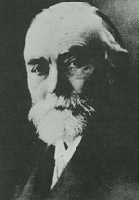 Born November
8, 1848, in Wismar - died in July 26, 1925, in Bad Kleinen. Frege was
a german mathematician and logician who founded modern mathematical
logic. Working on the border between mathematics, logic and
philosophy he practically invented an entire discipline.
Born November
8, 1848, in Wismar - died in July 26, 1925, in Bad Kleinen. Frege was
a german mathematician and logician who founded modern mathematical
logic. Working on the border between mathematics, logic and
philosophy he practically invented an entire discipline.Frege became bitter by the lack of understanding from his colleagues in his own lifetime. Even though he was sure about his own genius, his work was so independent from other influences, past or present, that the understanding for his work didn't come until much later, to a certain extent because of Russell's work.
Frege was married but his wife during World War I, and did not have any children of his own. However, he had an adopted son, who became an engineer. Dur ing the war he developed a hatred of socialism and democracy, to which he blamed the loss of the war. He also was an anti-Semitist who believed all Jews should be expelled from Germany.
Works: - Begriffsschrift, eine der arithmetischen nachgebildete Formelsprache des reinen Denkens (1879; eng. Concept Notation, a formal language of pure thought, modelled upon that of arithmetic ) - Die Grundlagen der Arithmetik: eine logisch-mathematische Untersuchung über den Begriff der Zahl (1884; eng. The Foundations of Arithmetic: A logico-mathematcial enquiry into the concept of number ) - Funktion und Begriff (1891; eng. Function and Concept ) - Über Sinn und Bedeutung (1892; eng. On Sense and Denotation ) - Über Begriff und Gegenstand (1892; eng. On Concept and Object ) - Grundgesetze der Arithmetik (Volume I 1893, Volume II 1903; eng. Basic Laws of Arithmetic ) - Was ist eine Funktion? (1904; eng. What is a Function? ) - Der Gedanke. Eine logische Untersuchung (1918; eng. The Thought: A Logical Enquiry)
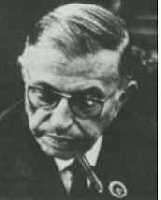 Renowned as
a philosopher, literary figure, and social critic, Jean Paul Sartre,
b. Paris, June 21, 1905, d. Apr. 15, 1980, was probably most famous
as a representative of Existentialism,
a philosophical approach that emphasizes, among other things, the
ultimacy of human freedom. In his later writings, however, Sartre
attempted to combine the individualism of his existentialist work
with a form of Marxism, which stresses the collective aspects of
human existence.
Renowned as
a philosopher, literary figure, and social critic, Jean Paul Sartre,
b. Paris, June 21, 1905, d. Apr. 15, 1980, was probably most famous
as a representative of Existentialism,
a philosophical approach that emphasizes, among other things, the
ultimacy of human freedom. In his later writings, however, Sartre
attempted to combine the individualism of his existentialist work
with a form of Marxism, which stresses the collective aspects of
human existence.
As Sartre explained in his autobiography, The Words (1963; Eng. trans., 1964), his career as an author was a response to his childhood experiences of rejection. He graduated from the Ecole Normal Superieure, Paris, in 1929, by which time he had met Simone de Beauvoir, who became his lifelong companion as well as his intellectual associate.Sartre taught in various lycees, or secondary schools, until 1945, after which time he devoted himself exclusively to writing and editing the journal Les Temps Modernes (Modern Times). He spent a year as a prisoner of war during World War II and was a key figure among the French intellectuals who resisted the Nazi occupation.
Philosophical Works
Under the influence of Edmund Husserl and, more importantly, Martin Heidegger, Sartre developed his existentialism as an analysis of self-consciousness in relation to Being. In the 1930s he wrote several phenomenological analyses of the imagination and the emotions, which culminated in his most important philosophical work, Being And Nothingness (1943; Eng. trans., 1956).
This book provided a brilliant philosophical structure for the inchoate feelings of dissatisfaction that swept postwar Europe. The book's central idea is the opposition between objective things and human consciousness, the latter being a non-thing insofar as its reality consists in standing back from things and taking a point of view on them. Because consciousness is a non-thing (which is a somewhat better translation of Sartre's "neant" than the literal translation, "nothingness"), it does not have any of the causal involvements that things have with other things. This means that consciousness and thus humans themselves are essentially free, and that any attempt by an individual person or a philosophical theory to believe otherwise is a form of self-deception, or "bad faith."
Ironically, the freedom of human consciousness is experienced by humans as a burden ("Man is condemned to be free"). Human projects, therefore, consist in the impossible attempt to become a free consciousness, such as when a person tries to become an intellectual or a parent or to play any other determinate social role. Because the impossibility of this attempt to become a conscious thing --in Sartre's terminology, a for-itself-in-itself-- does not prevent humans from being irresistibly drawn to undertake it, Sartre declares that "man is a useless passion." Whether this entails that all human life is futile and without value, however, is another issue, and the vigor of Sartre's own life suggests that he himself did not draw this conclusion. Another debatable issue is whether there is any significant continuity between Sartre's existentialism and his later Marxist work, The Critique of Dialectical Reason (1960), a difficult analysis of social existence in which he attempts to explain how the freedom of the individual is related to history and the class struggle.
Literary Works
Most of Sartre's literary output reflects his existentialism, although in 1960 he began writing a four-volume study of Gustave Flaubert that combines Marxist and Freudian approaches. In his first novel, Nausea (1938; Eng. trans., 1949), the protagonist, Roquentin, finds himself weighed down and sickened by the opposition between things and consciousness, a theme analyzed philosophically in Being and Nothingness. In the most famous part of the novel, Roquentin comes up against the impenetrableness of things in the form of a gnarled old chestnut tree root, whose opaqueness to his understanding eventually demonstrates to him the ultimate absurdity of an existence that cannot be analyzed. In subsequent works, particularly his short stories in Intimacy (1939; Eng. trans., 1949), his other novels, and his plays, Sartre presents the ethical dilemmas generated by one's commitment to a course of action, usually political action. This is particularly clear in the three novels that are collectively entitled The Roads To Freedom (1945-49; Eng. trans., 1947-50).
Similar dilemmas occur in his dramas Dirty Hands (1948; Eng. trans., 1949) and The Condemned of Altona (1959; Eng. trans., 1961), both of which take up the problem of responsible political action and end with the suicide of the main character. But Sartre's most popular play is undoubtedly the one-act drama No Exit (1944; Eng. trans., 1947), which is a discussion of such familiar negative existentialist themes as bad faith, self-destruction, and the impossibility of interpersonal relationships. It is in this play that Sartre's famous line, "Hell is other people", occurs.
Sartre also wrote numerous essays about literature. He argued in What Is Literature? (1948; Eng. trans., 1949) that literature must be political, and he devoted his journal Les Temps Modernes to this point of view. He wrote essays about William Faulkner (1938), Charles Baudelaire (1946), and Jean Genet (1952). His essays on Baudelaire and Genet employ the technique of existential psychoanalysis, a term coined by Sartre to describe discerning, from the details in a person's life, the nature of the fundamental project that animates him or her, and how the project came into being.
(by Thomas E. Wren)